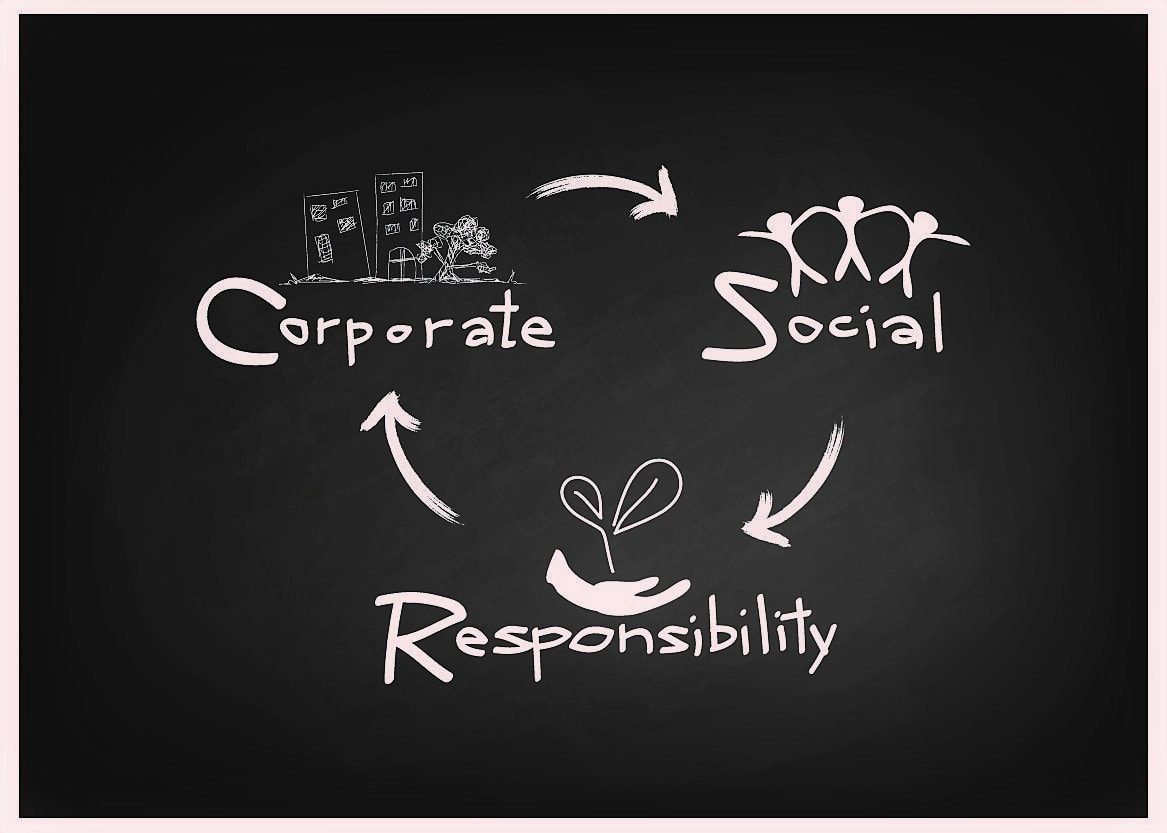There is an ongoing debate as to whether businesses have a responsibility to be socially responsible. The term “social responsibility” can mean different things to different people, but generally it refers to the idea that businesses should act in ways that are beneficial to society as a whole. Proponents of social responsibility argue that businesses have a moral obligation to do things like protect the environment, support employees, and give back to the community.
Critics of social responsibility argue that businesses should focus solely on making profits and that they should not be required to shoulder the burden of solving societal problems.
What is Corporate social responsibility (#CSR) ?
What is Corporate Social Responsibility?
Corporate social responsibility (CSR) is a business approach that contributes to sustainable development by delivering economic, social and environmental benefits for all stakeholders.
The term generally applies to companies’ efforts to improve their relationships with employees, customers, suppliers, communities and other partners.
It also encompasses a company’s efforts to reduce its negative impact on the environment.
A company that embraces CSR can play an important role in creating a better world. Through their activities, businesses can help address some of the most pressing global challenges of our time, such as poverty, climate change and human rights abuses.
When done well, CSR can also be good for business. It can help companies build trust and loyalty among employees and customers, attract top talent, boost innovation and productivity, and reduce costs. In fact, many companies are finding that sustainability makes good business sense.
What is Corporate Social Responsibility And Why is It Important
Corporate social responsibility (CSR) is a business approach that contributes to sustainable development by delivering economic, social and environmental benefits for all stakeholders.
The term ‘stakeholder’ refers to anyone who can affect or be affected by the actions of an organisation. This includes employees, suppliers, customers, local communities and society as a whole.
Sustainable development is based on three pillars: economic growth, social inclusion and environmental protection. CSR helps organisations operate in a way that meets the needs of these three pillars simultaneously. In other words, it helps businesses be more profitable while also benefiting people and the planet.
There are many reasons why CSR is important. Firstly, it’s good for business. Customers are increasingly interested in buying from companies that have a positive impact on society and the environment.
This trend is only going to continue as millennial consumers become an even bigger force in the marketplace. What’s more, employees want to work for organisations that align with their personal values – so CSR can help you attract and retain top talent. Finally, CSR can help you manage risk better; by addressing social and environmental issues proactively, you can avoid potential reputational damage down the line.
On a broader level, CSR is important because it contributes to sustainable development – which is essential for ensuring long-term prosperity for both people and planet Earth.
Examples of Corporate Social Responsibility Pdf
What is Corporate Social Responsibility?
The term “corporate social responsibility” (CSR) has come to be used increasingly since the late 1960s, and there are now a great variety of definitions of what CSR comprises. Broadly speaking, CSR refers to the voluntary activities undertaken by a company to operate in an ethical and sustainable manner that goes beyond compliance with minimum legal requirements.
In other words, it encompasses how a company chooses to balance its economic, social and environmental responsibilities.
There is no single blueprint for implementing CSR, as each company will have its own unique approach based on its size, sector, geographical location and other factors. However, there are some common themes that often crop up when discussing CSR initiatives.
These include:
• Community development – supporting local communities through initiatives such as employee volunteering, charitable giving or skills-based training;
• Diversity & inclusion – promoting workforce diversity and creating an inclusive culture within the organisation;
• Employee engagement – communicating effectively with employees and involving them in decision-making processes;
• Environmental sustainability – minimising the company’s impact on the environment through measures such as emissions reduction or resource efficiency;
• Ethical practices – ensuring that all business practices are conducted ethically and in compliance with relevant laws and regulations;
• Transparency & accountability – being open and honest about business operations, decision-making processes and financial performance.
List of Companies With Corporate Social Responsibility in the Philippines
The Philippines has been making great strides in terms of corporate social responsibility (CSR). In recent years, more and more companies have been implementing CSR programs and initiatives. This is a positive development, as it shows that businesses are starting to realize the importance of giving back to the community and doing their part to make the world a better place.
There are many different ways for businesses to get involved in CSR. Some common initiatives include providing financial support to local charities or non-profit organizations, organizing volunteer events, donating goods or services to those in need, and helping to raise awareness about important social issues.
Here is a list of some Filipino companies that have made CSR a priority:
1. Ayala Corporation – One of the country’s largest conglomerates, Ayala Corporation has been actively involved in CSR for many years. The company has various programs focusing on education, health care, environmental conservation, and poverty alleviation. It also runs its own foundation which provides scholarships and other assistance to disadvantaged youth.
2. JG Summit Holdings – JG Summit Holdings is another major conglomerate with a strong commitment to CSR. Its programs focus on areas such as education, livelihood training, environmental protection, and disaster relief. The company also has its own foundation which helps provide access to education for underprivileged children.
3.. SM Investments Corporation – SM Investments Corporation is one of the Philippines’ leading business groups. It has been deeply involved in CSR since 2006, when it established its own foundation dedicated to supporting various educational initiatives.

Credit: www.gageproducts.com
What is Meant by Corporate Social Responsibility?
Corporate social responsibility (CSR) is a company’s commitment to operate in an ethical and sustainable manner. This includes respecting the environment, human rights, and social welfare. It also involves being transparent about business practices and engaging with stakeholders.
There are many reasons why companies choose to implement CSR initiatives. For some, it is a way to give back to the community and make a positive impact on society. Others see it as good for business; by operating in a sustainable and responsible manner, companies can improve their reputation and build customer trust.
There are several ways in which companies can be socially responsible. One common approach is to focus on environmental sustainability. This can involve reducing energy consumption, waste production, and emissions.
Many companies also invest in renewable energy sources such as solar or wind power. Another area of focus for CSR initiatives is human rights. This includes ensuring that employees are treated fairly and providing them with decent working conditions and wages.
Additionally, many companies support diversity initiatives aimed at promoting inclusion in the workplace.
The concept of corporate social responsibility is still evolving and there is no one-size-fits-all approach to implementing it.
What are the 4 Corporate Social Responsibilities?
There are four types of corporate social responsibility: environment, human rights, philanthropy and community engagement.
1. Environment – A company has a responsibility to ensure that their operations do not negatively impact the environment. This includes reducing pollution, conserving resources and minimizing waste.
Many companies have implemented sustainability initiatives to reduce their environmental footprint.
2. Human Rights – A company should respect the human rights of its employees, customers and other stakeholders. This includes ensuring that working conditions are safe and fair, preventing discrimination and providing equal opportunity.
3. Philanthropy – A company can choose to support charitable causes through financial donations or volunteering programs. This helps to improve the lives of those in need and can also build goodwill for the company.
What is Csr And Why is It Important?
Corporate social responsibility (CSR) is a type of corporate self-regulation in which businesses monitor and ensure their active compliance with the spirit of the law, ethical standards, and international norms. The goal of CSR programs is to foster a more sustainable world.
The term “corporate social responsibility” came into common use in the early 1970s, and it has been used ever since by business leaders, academics, politicians, and others to describe how companies should manage their relationships with key stakeholders for the greater good.
There is no one universally accepted definition of CSR, but most scholars agree that it encompasses three main pillars: environmental protection, social justice, and economic development.
Environmental protection refers to a company’s efforts to minimize its negative impact on the environment. This includes reducing greenhouse gas emissions, conserving water resources, and reducing waste production.
Social justice refers to a company’s efforts to improve the well-being of employees, customers, and other members of society. This includes promoting diversity & inclusion initiatives, ensuring fair treatment of workers throughout the supply chain, and providing access to essential goods & services.
Economic development refers to a company’s efforts to create economic opportunities for disadvantaged groups within society.
What are the 6 Csr Principles?
The six principles of Corporate Social Responsibility are as follows:
1. Principle of accountability: Organizations are accountable to the public, their employees, shareholders, and other stakeholders for their actions. They should be transparent in their dealings and honest in their communication.
2. Principle of ethical behavior: Organizations should behave ethically in all their dealings, including with regard to human rights, environmental protection, and anti-corruption measures.
3. Principle of social responsibility: Organizations have a responsibility to contribute to the well-being of society. This can include supporting charitable causes, protecting the environment, and promoting diversity.
4. Principle of sustainable development: Organizations should strive to meet the needs of present generations without compromising the ability of future generations to meet their own needs. This includes reducing greenhouse gas emissions, using renewable energy sources, and conserving natural resources.
5 .
Principle of stakeholder engagement: Organizations should consult with and take into account the interests of all relevant stakeholders when making decisions that could affect them .This includes employees ,customers ,suppliers ,local communities ,and NGOs . 6 .
Principle Of Corporate Governance :Organizations Should Be Properly Governed So That They Can Be Accountable To All Their Stakeholders
These six principles provide a framework for businesses to operate in a socially responsible manner . By adhering to these principles , businesses can help create a more sustainable world while also protecting their own reputations and bottom lines .
Conclusion
Many businesses have a responsibility to society that goes beyond maximizing profits. This is known as corporate social responsibility (CSR). Corporate social responsibility can take many forms, such as environmental protection, support for charitable causes, or improving the conditions of employees.
The concept of CSR is still evolving, and there is no one-size-fits-all approach to it. However, all businesses should be aware of the potential impact their activities can have on society and make an effort to address any negative impacts.

